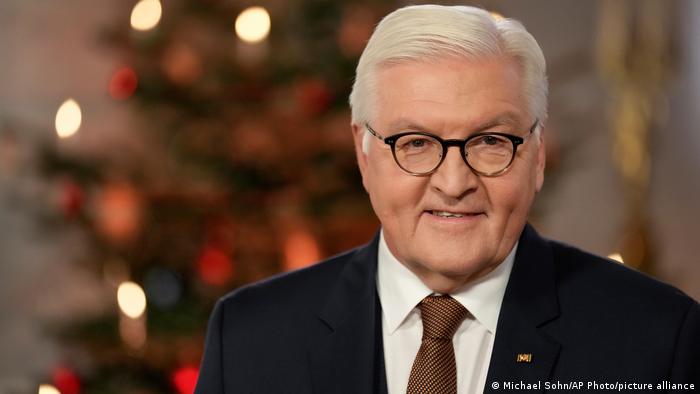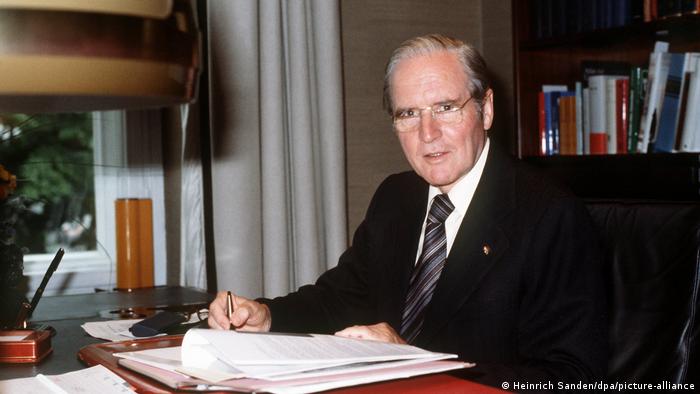When Frank-Walter Steinmeier announced in May that he was interested in running again for the office of president, many saw it as an unusual gamble in the cautious world of German politics.
For one thing, an incumbent president rarely declares his interest in a second term so readily. Secondly, the 65-year-old could have had no idea last year whether he could rely on a majority in the Federal Convention in the election on February 13 this year.
At the time, his center-left Social Democrats (SPD) were lagging behind the center-right Christian Democrats (CDU) in the polls ahead of the September 2021 election. Had the conservative party won, it would probably have installed a presidential candidate of its own.
As it was, the campaign of CDU chancellor candidate Armin Laschet became derailed by a series of gaffes, and the SPD’s Olaf Scholz became head of government against the odds. Scholz’s chosen coalition partners, the environmentalist Greens and the neoliberal Free Democrats, were soon on board with the idea of a second Steinmeier term, and so his election is all but certain. The CDU, still nursing the wounds of the defeat, has decided not run its own candidate in the election.

Drag queen Olivia Jones was one of the celebrIties who attracted media attention in the Federal Assembly in 2017
Stability is a plus
A total of 1,472 people will form the Federal Convention, a body that convenes every five years for the sole purpose of electing the president. It includes all 736 members of the Bundestag plus another 736 people chosen by representatives of the 16 German states. The latter group includes celebrities and other prominent figures. This year there will be several athletes, an astronaut, actors and several epidemiologists and health workers who were named as a sign of appreciation for their work during the pandemic. Ninety-two-year-old Karla Spagerer survived a COVID-19 infection. The SPD nominee and Holocaust survivor will be the oldest member of the assembly.
All things considered, Steinmeier’s reelection is not a bad outcome, Uwe Jun, politics professor at the University of Trier, told DW. “The general opinion on Steinmeier is that he has performed his role satisfactorily in his first term,” Jun said. “He’s someone who is very down-to-earth, who can talk to different social groups. And he always hit the right tone in difficult questions, in crisis questions, in the coronavirus pandemic. There’s never been a loud protest against his term in office.”
There have been easier times to be German president, an office whose social role as a unifying figurehead for the nation usually takes precedence over its constitutional role.
“The president has to represent Germany both domestically and to the world, and he has to perform an integrative role,” Jun said. “The latter has become more difficult because society is becoming more and more heterogenous and more polarized. Parts of society don’t want to be seen to be represented by him.”
“He plays an important function to society — bringing parts of society closer together,” said Ursula Münch, director of the Bavaria-based institute the Academy for Political Education. “And I would say that it has become more difficult for the president, because those who have lost faith in the political system will not trust the president as much.”
A powerful office — but only in a crisis
The German president is not as powerful as his counterparts in the United States, France and Russia. He does not command the armed forces, he is not able to put emergency laws into effect or decide to dissolve the parliament.
This relatively weak position of the office has its roots in German history. The President of the Weimar Repubic wielded substantial power. And in 1933, the elderly “Reichspräsident” Paul von Hindenburg was persuaded to use it to pave the way for Nazi dictator Adolf Hitler to take over the country.
The constitutional purpose of the president today only rarely becomes clear. He (and up till now it has always been a he) represents Germany as head of state, but makes no executive or policy decisions. But has constitutional powers to step in as a kind of arbiter when there is a political impasse: It is the president who decides, for example, whether the Bundestag must be dissolved if the chancellor loses a vote of no-confidence. He also has the power to veto laws if they believe they violate the German constitution.
“The founding mothers and fathers of the Basic Law consciously decided not give the president major powers. It’s an important position, but it’s not a powerful position — unless the other institutions are in crisis,” Münch said.
And such crises do happen, and can happen more frequently now that there are more parties in the Bundestag, making majority-building more difficult. Indeed, Steinmeier had to step in 2017 when Chancellor Angela Merkel failed to form a coalition with the Greens and the Free Democrats after her fourth election victory. It fell to the president to decide against triggering new elections, therefore forcing Merkel to form another grand coalition with the Social Democrats.
Marginal candidates have a role
Another element of the president’s social role arises from his independence from government. This allows him to raise awareness for issues that may not be on the radar of the parliament or the government.
That is also true of the election itself, which always includes extra candidates who stand no chance of winning, but who can use the opportunity to make a point.
In theory, any German who is at least 40 years old is eligible for election. Candidates may be proposed by any member of the Federal Convention. If none of the candidates receives an absolute majority in the first and second ballots, a third ballot is held. In this case, a relative majority is sufficient. New candidates can also be nominated for the second and third ballots.
In this election, there are three candidates other than Steinmeier: Gerhard Trabert, a doctor and independent candidate nominated by the socialist Left party; Max Otte, a CDU member nominated by the far-right Alternative for Germany (AfD); and Stefanie Gebauer, a 41-year-old physicist with the regional center-right Free Voters party.
“It’s always been a part of the presidential election that there were alternative candidates — that is important,” said Münch, who thinks that the Left party’s candidate, Trabert, was a “skillful, clever choice.”
“Of course, he won’t become president, and he doesn’t want to — he wants to carry on working as a doctor helping the disadvantaged,” she said. “But to use the election to draw attention to the fact that there are issues and social groups who we and the media are too often only marginally aware of.”
According to German media, the AfD had a different goal in choosing Otte: provoking political rivals. Otte is a member of the CDU’s nationalist-leaning wing, the WerteUnion (Values Union), and the AfD was apparently hoping to use his candidacy to suggest that some CDU voters might be more at home with the further-right party.
Either way, none of this need concern President Steinmeier as he prepares for a second swearing-in ceremony.
Edited by: Rina Goldenberg
While you’re here: Every Tuesday, DW editors round up what is happening in German politics and society. You can sign up here for the weekly email newsletter Berlin Briefing.

Corresponsal de Argentina, Encargado de seleccionar las noticias más relevantes de su interés a nuestro sitio web NewsPer.com

















